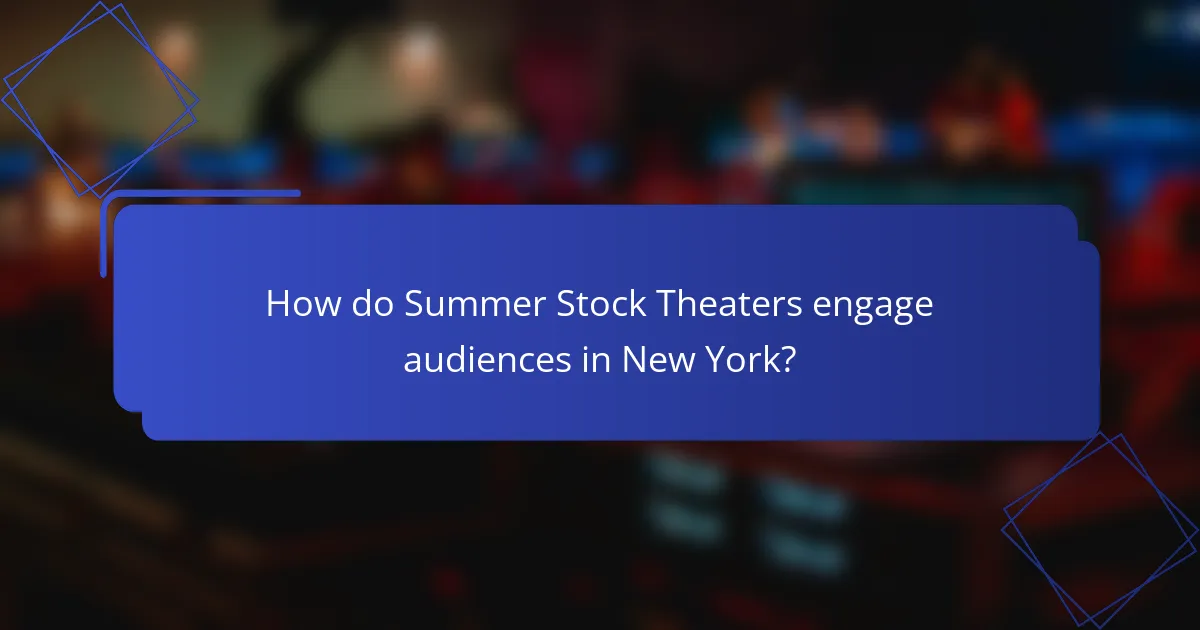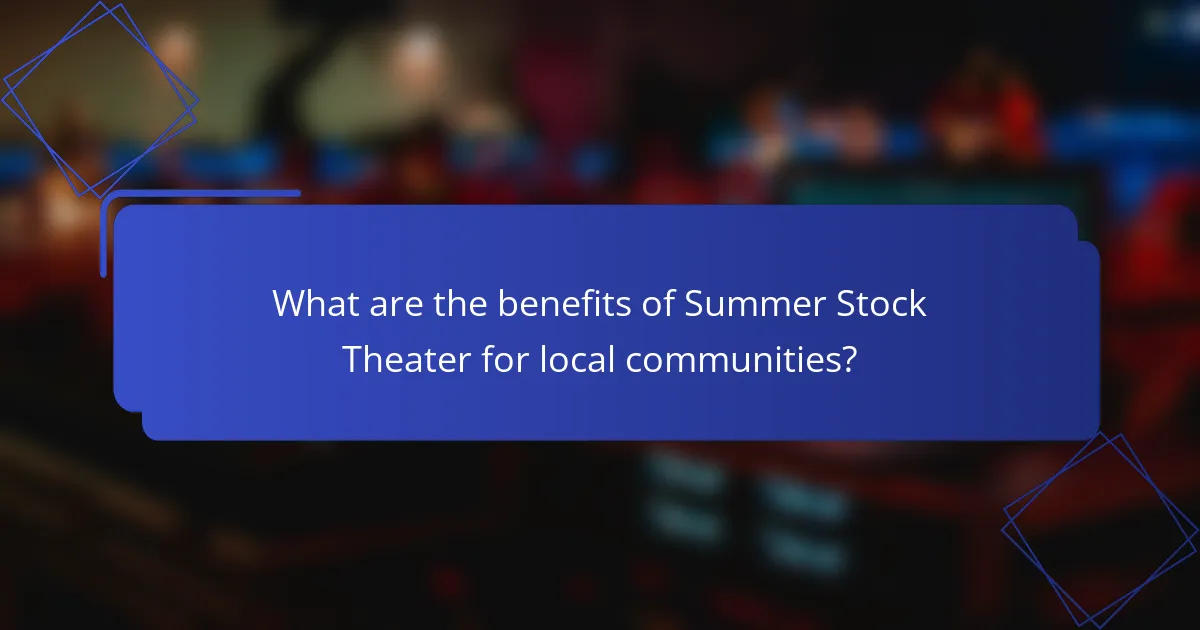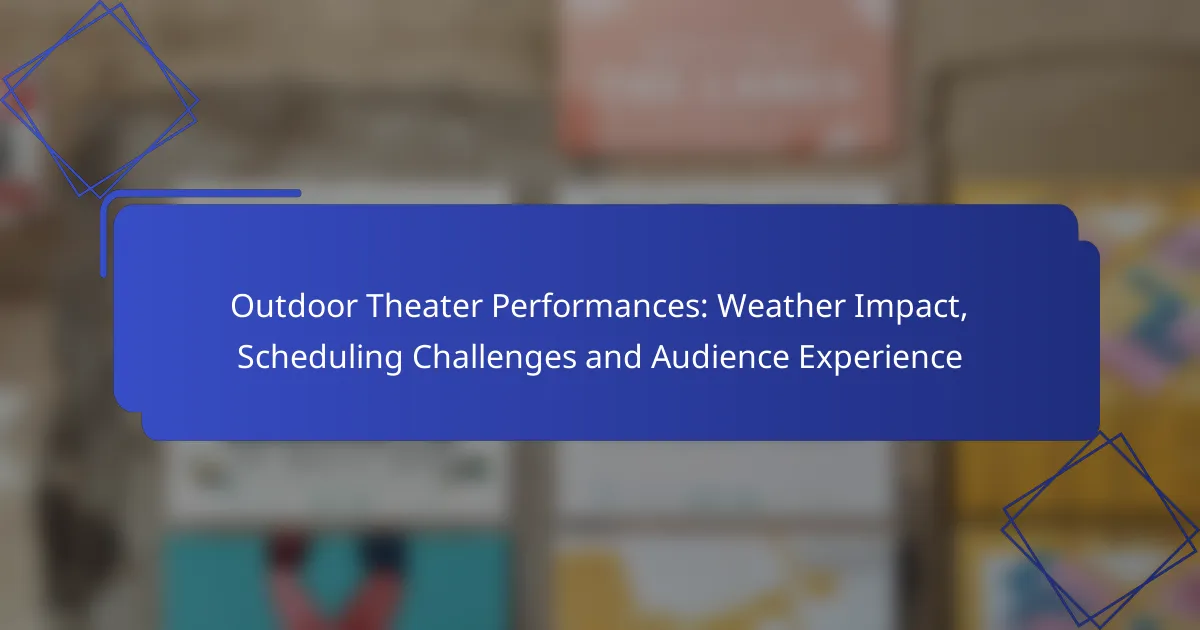Summer stock theater and year-round productions offer distinct experiences for audiences, shaped by their operational structures and engagement strategies. While summer stock theaters thrive on seasonal themes and community involvement to create a vibrant atmosphere, year-round productions provide a continuous schedule that fosters deeper, long-term relationships with patrons. Understanding these differences can enhance appreciation for the unique contributions each type of theater makes to the arts landscape.

How do Summer Stock Theaters engage audiences in New York?
Summer stock theaters in New York engage audiences through a combination of interactive performances, community involvement, and seasonal themes. These elements create a vibrant atmosphere that attracts diverse audiences and fosters a sense of connection to the local arts scene.
Interactive performances
Interactive performances are a hallmark of summer stock theaters, allowing audiences to participate in the storytelling process. This can include audience members being invited on stage or engaging in Q&A sessions with the cast. Such interactions enhance the overall experience and make the performances more memorable.
For instance, some productions may incorporate improvisational elements where audience suggestions influence the direction of the show. This not only entertains but also builds a stronger bond between performers and viewers.
Community involvement
Community involvement is crucial for summer stock theaters, as they often collaborate with local organizations and schools. These partnerships can lead to workshops, outreach programs, and special events that encourage local participation in the arts. Engaging the community helps to cultivate a loyal audience base and fosters a sense of ownership over the productions.
Additionally, summer stock theaters may offer discounted tickets or free performances for local residents, making theater accessible to a broader audience. This strategy not only increases attendance but also strengthens community ties.
Seasonal themes
Seasonal themes play a significant role in summer stock theater programming, with productions often reflecting the spirit of summer. This can include light-hearted musicals, classic comedies, or family-friendly shows that resonate with the warm weather and vacation mindset. Such themes attract families and tourists looking for enjoyable entertainment options during their summer visits.
Moreover, themed events, such as outdoor performances or festivals, can further enhance audience engagement. These events create a festive atmosphere that encourages social interaction and community celebration, making the theater experience more enjoyable for everyone involved.

What are the key differences between Summer Stock Theater and Year-Round Productions?
Summer Stock Theater typically operates for a limited season, focusing on short-term productions, while Year-Round Productions maintain a continuous schedule with a diverse range of performances throughout the year. These differences influence everything from production schedules to audience engagement strategies.
Production schedule
Summer Stock Theater usually runs for a few months during the summer, featuring a series of shows that often rotate weekly or bi-weekly. This fast-paced schedule allows for a vibrant, energetic atmosphere but can limit the depth of production quality due to time constraints.
In contrast, Year-Round Productions have the flexibility to plan longer runs for individual shows, often spanning several weeks or even months. This extended schedule enables deeper audience engagement and allows for more elaborate staging and rehearsals.
Audience demographics
Summer Stock Theater often attracts a more transient audience, including tourists and seasonal visitors looking for entertainment during their vacation. This demographic can vary widely, from families to young adults, depending on the location and type of productions offered.
Year-Round Productions tend to cultivate a more stable audience base, including local residents who may become regular attendees. This allows for targeted marketing strategies and the development of community relationships, enhancing loyalty and repeat attendance.
Budget considerations
Summer Stock Theater generally operates on tighter budgets, relying heavily on ticket sales and often utilizing local talent and resources to minimize costs. This can limit the scale and complexity of productions but encourages creativity and innovation.
Year-Round Productions typically have more robust financial backing, allowing for larger budgets that can accommodate professional talent, higher-quality sets, and marketing efforts. This financial stability can lead to a more polished product but also requires careful financial planning to maintain sustainability throughout the year.

How does audience engagement differ in Year-Round Productions?
Audience engagement in year-round productions tends to be deeper and more sustained compared to summer stock theater. This is largely due to consistent programming, the ability to build long-term relationships with patrons, and a greater variety of performances throughout the year.
Consistent programming
Year-round productions offer a steady schedule of performances, which helps to establish a reliable presence in the community. This consistency allows audiences to plan their visits and fosters a habit of attendance, leading to higher engagement levels.
For example, theaters may run a season of plays that includes classics, new works, and musicals, ensuring there is something for everyone. Regular programming can also include special events, workshops, and community outreach, further enhancing audience connection.
Long-term relationships
With year-round productions, theaters have the opportunity to cultivate long-term relationships with their audience members. This can be achieved through loyalty programs, subscription packages, or membership options that encourage repeat attendance.
Engaging with patrons through newsletters, social media, and personalized communications can also strengthen these relationships. When audiences feel valued and recognized, they are more likely to return and support the theater consistently.
Variety of performances
Year-round theaters typically showcase a diverse range of performances, appealing to different tastes and demographics. This variety can include dramas, comedies, musicals, and experimental works, which keeps the programming fresh and exciting.
By offering a mix of genres and styles, theaters can attract a broader audience base. Additionally, special events like themed nights or collaborations with local artists can enhance the overall experience and draw in new patrons.

What are the benefits of Summer Stock Theater for local communities?
Summer Stock Theater provides numerous advantages for local communities, including economic stimulation, opportunities for talent development, and cultural enrichment. These benefits foster community engagement and enhance the local arts scene.
Economic boost
Summer Stock Theater can significantly contribute to the local economy by attracting visitors and generating revenue. Local businesses, such as restaurants and hotels, often see increased patronage during theater seasons, leading to a boost in sales and job creation.
For example, a small town hosting a Summer Stock production may experience a rise in tourism, with visitors spending on accommodations, dining, and shopping. This influx can lead to a multiplier effect, benefiting various sectors within the community.
Talent development
Summer Stock Theater serves as a vital platform for aspiring artists, providing them with hands-on experience in performance, production, and stage management. Participants often include local actors, directors, and crew members who gain valuable skills and exposure in a supportive environment.
Many theaters also offer workshops and mentorship programs, allowing young talent to learn from seasoned professionals. This nurturing environment can lead to career advancements and increased opportunities within the performing arts industry.
Cultural enrichment
Summer Stock Theater enhances the cultural landscape of a community by offering diverse performances that reflect local stories and traditions. These productions often include a mix of classic plays, contemporary works, and original pieces, catering to a wide range of audiences.
Community members benefit from access to high-quality entertainment that fosters appreciation for the arts. Additionally, these events can encourage dialogue and collaboration among residents, strengthening community bonds and cultural identity.

How can theaters improve audience engagement strategies?
Theaters can enhance audience engagement by leveraging modern communication tools, actively seeking feedback, and creating collaborative experiences. These strategies help to build a loyal audience base and foster a sense of community around the theater.
Social media marketing
Social media marketing is essential for theaters to reach a wider audience and engage with patrons in real-time. Platforms like Facebook, Instagram, and Twitter allow theaters to share updates, behind-the-scenes content, and promotional offers, making it easier to attract new attendees.
To maximize impact, theaters should create a content calendar that aligns with their production schedule. Regular posts, engaging visuals, and interactive content such as polls or Q&A sessions can significantly boost audience interaction and interest.
Audience feedback systems
Implementing audience feedback systems helps theaters understand their patrons’ preferences and improve future productions. Surveys, comment cards, and online reviews provide valuable insights into audience experiences and expectations.
Theaters should consider offering incentives, such as discounts on future tickets, to encourage feedback. Analyzing this data can guide programming decisions and enhance overall audience satisfaction.
Collaborative events
Collaborative events, such as workshops, talkbacks, or community performances, can deepen audience engagement by fostering a sense of ownership and connection to the theater. These events allow patrons to interact with artists and participate in the creative process.
For example, hosting a local playwright’s night or a community talent showcase can attract diverse audiences and encourage participation. Theaters should aim to create inclusive events that resonate with the local community, enhancing loyalty and attendance.



